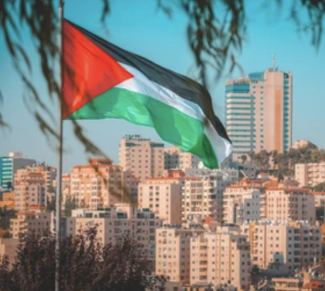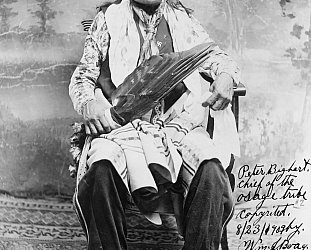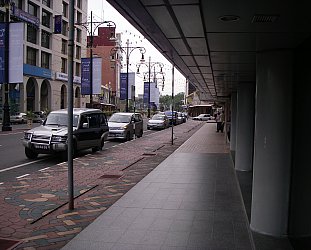Graham Reid | | 11 min read

We saw this in April when Arafat was similarly isolated, so we know what will come next: Palestinian teenagers throwing rocks at Israeli soldiers and tanks, more Israeli reprisals, more Palestinian martyrs. There will be suicide bombings and civilians will die.
This time Palestinians believe the tanks will stay. Israeli authorities speak openly of them being there for at least three months.
Where is the way out of this horrific, destructive, generational conflict?
The protagonists cannot break the stalemate. Not the United States, with the Bush administration conspicuously faltering on Middle East policy. Not Israel, under the uncompromising Prime Minister Ariel Sharon. Not the Palestinians, under the failing decade-long leadership of Yasser Arafat.
President Bush's Middle East policy speech this week was thick with the rhetoric of hope. He urged a new Palestinian leadership free of terrorism and corruption, suggested Israel withdraw to the positions it held before September 28, 2000, and stop settling the occupied territories.
In Israel, Bush's statement naturally played well with those who want Arafat gone. Defence Minister Binyamin Ben-Eliezer said he would support "a very significant compromise for the sake of peace, if we find opposite us a reliable, peace-seeking partner, clean of terrorism and with a will for historic compromise".
His comments allowed Sharon's office to say that when there was a complete cessation of terror, violence and incitement, and when the Palestinian Authority was reformed and headed by new leadership, it would be possible to move ahead politically.
The Palestinian response was predictably blunt. Chief negotiator Saeb Erakat said, "The Palestinian people have chosen President Arafat as their leader, and the world and President Bush must respect the democratic choice of the Palestinian people."
Arafat was more receptive, saying he welcomed Bush's statement, and that the ideas were serious contributions to the peace process. Very few believe him. Arafat is playing for time.
Some Palestinian officials noted Bush's insistence that ending Israeli occupation was the only way to achieve peace.
"This is a historic change in the American stand," said Palestinian Cabinet Secretary Ahmed Abdel Rahman.
Others read Bush's statement as patronising and muddled. In the on-line magazine Salon Gary Kamiya wrote: "The weird schizophrenia of the Bush administration's position is that it implicitly recognises that the Palestinians have a just cause - why else would Bush call for a Palestinian state and use the word 'occupation' to describe the Israeli presence in the West Bank and Gaza? - but denounces the fact that it uses violence to realise that cause.
 "This is the language of the pulpit, not the real world. Yes, suicide bombings against civilians are abhorrent. War itself - which in the 20th century generally involves the indiscriminate slaughter of civilians - is abhorrent. But it is not customary for world powers to lecture militant movements about their tactics or leadership while implicitly endorsing their goals. Such lectures are nothing more than moral grandstanding."
"This is the language of the pulpit, not the real world. Yes, suicide bombings against civilians are abhorrent. War itself - which in the 20th century generally involves the indiscriminate slaughter of civilians - is abhorrent. But it is not customary for world powers to lecture militant movements about their tactics or leadership while implicitly endorsing their goals. Such lectures are nothing more than moral grandstanding."European leaders cautiously endorsed the Bush line but many drew back from his implicit suggestion that Arafat be replaced. Britain's Foreign Secretary, Jack Straw, told the House of Commons that if Arafat were re-elected, Britain "would deal with him".
"We deal with the leaders that are elected and, in the case of dictatorial regimes, with those that are not elected."
But these are just words about words. The tanks are still rolling, the rocks and rubble are still being thrown, and yet another peace proposal is offered in which the language cripples any outcome in advance.
Recently Bush urged Israel to recognise "a provisional Palestinian state", but Palestinian cabinet minister Nabil Shaath immediately pointed out, "There is no such thing as a 'provisional state'."
Democratic senator Joe Lieberman echoed the sentiment: "I don't know what a provisional state means. Either you're a state or not a state."
After 20 months of Palestinian suicide bombers, the problem with any peace initiative is, as Senate Republican leader Trent Lott told CNN: "You've got to be careful not to give any impression that you are rewarding terrorism."
And the image of Palestinians is of stone-throwing teenagers and bomb-strapped terrorists blowing up civilians on a bus in Jerusalem.
Edward Said, the Columbia University Professor of Comparative Literature who is respected as Palestine's foremost political commentator, notes such a characterisation is part of the dehumanising process that marginalises genuine Palestinian aspirations and suggests all Palestinians support terrorism.
He considers the image a consequence of the suicide bombings which have "disfigured and debased the Palestinian struggle".
"All liberation movements in history have affirmed that their struggle is about life, not about death. Why should ours be an exception?"
But the issues remain mired in the complex confluences of history and religion, melded with the expediencies of contemporary politics.
Bush unequivocally backs Sharon and they often speak with the same phrases. Bush's axis of evil (North Korea, Iran, Iraq) found its echo in Sharon's statement: "We are facing a coalition of terror led by the Palestinian Authority and backed by an axis of evil - Tehran, Baghdad, Damascus and bin Laden."
In the Gaza Strip, Suleiman Berberi, a 39-year-old Arabic teacher, heard Bush's speech this week and said, "I swear to God that this speech was written and sent by Sharon."
Whoever wrote it, for many it was just another speech.
Last week, before Bush's statement, Arafat belatedly said he would have accepted the plan devised by former President Clinton. This met understandable coolness: Bush would never accept a Clinton-brokered deal and times have changed with the escalation of the conflict.
Arafat's ludicrous acceptance of an old plan was clearly just more stalling, and the world knew it. Israel ignored it and, on the same day, began re-occupying Palestinian towns and villages on the West Bank and Gaza.
Arafat is now, under the added pressure of Bush's statement, out to save his own position. He is widely perceived among many Palestinians, as well as Israelis, as either unwilling or unable to control militants and is increasingly concerned with political survival. Elections for his position and the Palestinian legislature are scheduled for January.
Yet he has been a potent symbol of Palestinian resistance, never more so than in April when he was besieged in Ramallah and was filmed holding meetings by candlelight. But he is also increasingly a liability, for many Palestinian intellectuals and the middle class. As pro-Palestinian commentator Said notes, Arafat's failure to negotiate a peaceful settlement for Palestinians has brought opprobrium and scorn.
"He is the leader of a long-suffering people, whom in the past year he has exposed to unacceptable pain and hardship ... Leaders of independence and liberation movements have no business exposing their unarmed people to the savagery of war criminals like Sharon, against whom there was no real defence.
"Why then provoke a war whose victims would be mostly innocent people when you have neither the military capacity to fight one, nor the diplomatic leverage to end it?"
Whether or not Arafat remains, the militants have their own reasons to continue the terror. The killings at Jenin and resentment at the continuing Israeli presence fuel the rage, but the ideology of the terrorist organisation is not prompted by immediate righteous anger. It is a political act aimed at the destruction of a peace process which, if successful, would destroy the militants' vision of total victory.
And so the tanks roll and the children pick up stones. Paradoxically, some observers believe the standoff might be one of the paths to resolution.
As Canada-based Mahmood Elahi wrote for the Palestine Daily, while both sides have sought a military solution for a political problem, each now must privately acknowledge it has underestimated the other's resolve. This could unlock the stalemate if there is a groundswell on each side recognising neither can break the will of the other.
Despite Bush's partiality, his belief that Arafat must go might be right, although he was elected with 87 per cent of the vote in 1996 and said this week he will stand again. But replacing Arafat may break part of the deadlock and allow other voices, not so tainted with the past, to be heard.
If some aspects of the peace process were accepted, then voices from the educated middle class could start a dialogue with like-minded Israelis, who are equally weary of the cycle of death.
Palestinians may be characterised by those images of stone-throwers and bomb-carriers, but as Kareem Fahim reported recently in New York's Village Voice, in Ramallah more than one-third of the population is Palestinian American, educated abroad and expecting better days. Right now, however, many are leaving.
There are Palestinians who reject suicide bombing - 2000 academics and intellectuals have signed a petition calling for the end of this morally bankrupt strategy.
Palestinian leader Hanan Ashwari wrote in The Progressive magazine: "As Palestinians, albeit the victims, we too have to admit our share of the blame and ask ourselves ... why and when we allow a few from our midst to interpret Israeli military attacks on innocent Palestinian lives as a licence to do the same to their civilians?"
Should Arafat be shifted, something parallel would need to happen in Israel. The polls suggest Israelis believe Sharon, a former general who 20 years ago led an Israeli incursion into the Gaza Strip and squared off against Arafat, is the right Prime Minister for the climate. But for talks to make progress Israelis would need a more accommodating negotiator.
Within Israel's middle class many recognise the need for meaningful dialogue, but the suicide bombing has muted these voices. If terrorism ceases, more moderate voices within Sharon's centre-left coalition might be heard, including Foreign Minister Shimon Peres, of the Labor Party.
There are small but incremental signs of change in Israel: There is the Shalom Achshav (Peace Now) movement, and before the recent outbreak of terrorism an anti-war demonstration in Tel Aviv drew 60,000. Even last weekend there were demonstrations for peace outside Sharon's home.
There is also dissent in the military, with more reservists refusing to serve in some of the occupied territories.
Parallel to that is the understandable fear of terrorism and the suspicion of new Jewish settlers in occupied territory that they could be left even more vulnerable.
Yehudit Tayyar, spokeswoman for the Settlers' Council, which represents 200,000 Jewish settlers in the West Bank and Gaza Strip, praised Bush's call for new Palestinian leadership, but said he should not try to impose a freeze on building settlements. "This is a domestic Israeli issue and no business of the United States," she said.
But it clearly is a domestic issue in the US, with many Jewish Americans being vocal and financial supporters of the Israeli cause.
Right now, Sharon can argue his enemy is America's enemy, and that enemy is terrorism as epitomised by Arafat and the militant organisations, notably Hamas, which this week promised to "intensify martyrdom operations". In many American minds Arafat is just another mad militant like Osama bin Laden, and Palestinians are still characterised as bomb-toting teenagers wired up on martyrdom.
That kind of distorted, dehumanised and demonised image has kept support for Israel high - and suicide bombers blowing up civilians on a bus are never going to get much sympathy.
Getting past that preconception is essential, says Said. "What is so astonishing is that notions of co-existence between peoples plays no part in this kind of distortion. Whereas American Jews want to be recognised as Jews and Americans in America, they are unwilling to accord a similar status to Arabs and Palestinians as another people that has been oppressed by Israel since the beginning."
The issue is as much about changing preconceptions as it is about getting extremists of both sides to allow other voices to be heard. Those are the challenges all parties are conspicuously failing to respond to.
Meanwhile, Israel is turning itself into a fortress surrounded by a wall - which ironically will cut off some Jewish settlements - and the tanks still roll. And boys will throw stones at heavily armed, uniformed men not much older than themselves.
It is wearingly familiar and peace, or even just security, still seems a distant hope.





post a comment